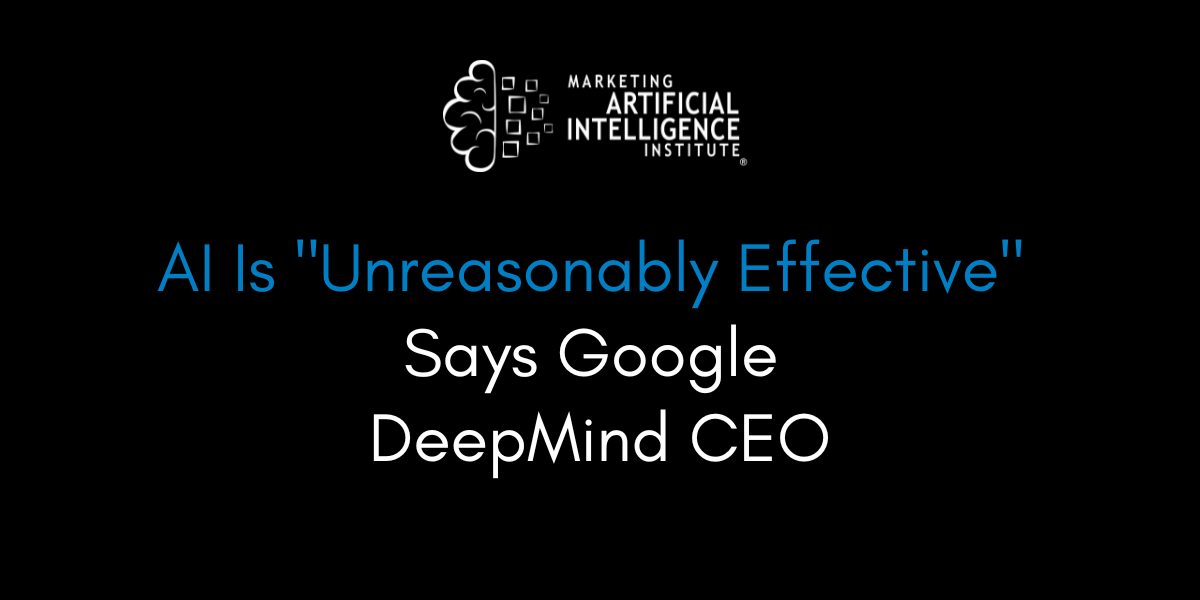After a two-year hiatus, the highly anticipated "Google DeepMind: The Podcast" has made its triumphant return.
Hosted by the brilliant Professor Hannah Fry, this season kicks off with a fascinating interview featuring Google DeepMind CEO Demis Hassabis.
As the first season to launch since the debut of ChatGPT, it offers a unique perspective on the rapidly evolving AI landscape…
And it holds some clues about where AI is headed.
I unpacked it all with Marketing AI Institute founder and CEO Paul Roetzer on Episode 111 of The Artificial Intelligence Show.
Why an Interview with Demis Hassabis Matters
Demis Hassabis isn't just another tech CEO—he's a visionary at the forefront of AI development as the head of DeepMind, which is now part of Google.
"Demis is going to be one of the most important people of our generation, if not all of human history,” says Roetzer.
DeepMind's achievements under Hassabis, including AlphaGo and AlphaFold, have already pushed the boundaries of what's possible in AI. And they appear to be just getting started. Google DeepMind has been busy this year releasing its increasingly powerful Gemini AI models and incorporating those models into Google products.
Yet, despite his pivotal role in shaping the future of AI, Hassabis remains relatively unknown outside tech circles.
So, when he talks, he’s very much worth listening to, says Roetzer
Key Takeaways from the Podcast
And what he said on the podcast gives us some clues about how to approach AI in 2024. Here are some of the top takeaways from the episode.
1. AI's "Unreasonable Effectiveness"
Hassabis describes large language models as "unreasonably effective," noting their ability to learn and generalize from examples in ways that weren't anticipated even five years ago. This rapid progress underscores the unpredictable nature of AI development, says Roetzer.
2. The Hype Paradox
When asked about the current state of AI hype, Hassabis offered a nuanced view.
He said that AI appeared to be over-hyped in the short-term, with many claiming AI can do things it can't, leading to unrealistic expectations and misguided investments.
But it also is under-hyped in the long term. Hassabis noted that many still underappreciate what happens when we reach artificial general intelligence (AGI).
“Now keep in mind here, he’s not saying if [we reach AGI]. He believes it is a when, as does Sam Altman and many of the others,” says Roetzer.
3. Evaluating AI Startups
For those trying to navigate the crowded field of AI startups, Hassabis also has some advice. He recommends investors do things like look at:
- Technical due diligence and understanding of current trends
- The background and technical expertise of the team
- How long they've been involved in AI (he cautions being wary of those who've recently pivoted from other trendy fields)
4. The AI Race: A Three-Horse Competition
According to Hassabis, the main players to watch in AI development are:
- Google's Gemini
- OpenAI's ChatGPT
- Anthropic's Claude
While other companies like Meta and Mistral are making strides, Hassabis sees these three as the current frontrunners.
5. The Future of Open Source in AI
While DeepMind has been a proponent of open-sourcing some of its work (like AlphaFold), Hassabis expresses caution about the future:
"In two, three, four years time, especially when you start getting agent-like systems or agentic behaviors, then if something's misused by someone or perhaps even a rogue nation state, that could be serious harm."
He suggests a potential solution: implementing more checks on frontier models and only open-sourcing them after a year or two of controlled use.
6. The Next Frontier: AI Agents
Hassabis believes the next big leap in AI will be the development of more agent-based systems—AI that can take actions in the world rather than just answering questions. He hints at DeepMind's unique advantage in this area:
"But of course, that's what we're expert in. That's what we used to build with all our game agents, AlphaGo and all of the other things we've talked about in the past. And I think that's going to be, you know, the next generation of systems. You can think of it as combining AlphaGo with Gemini.”
Mike Kaput
As Chief Content Officer, Mike Kaput uses content marketing, marketing strategy, and marketing technology to grow and scale traffic, leads, and revenue for Marketing AI Institute. Mike is the co-author of Marketing Artificial Intelligence: AI, Marketing and the Future of Business (Matt Holt Books, 2022). See Mike's full bio.



